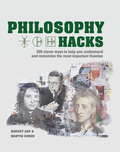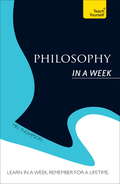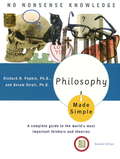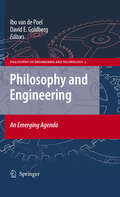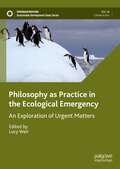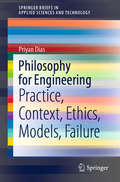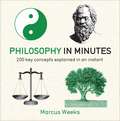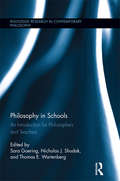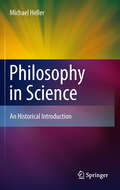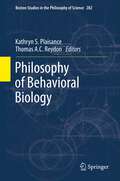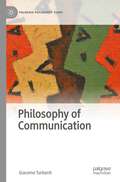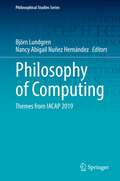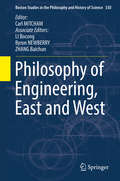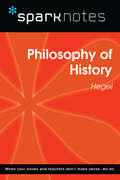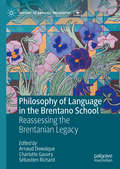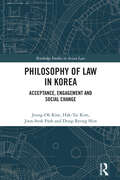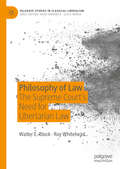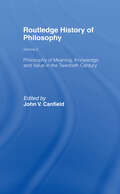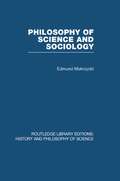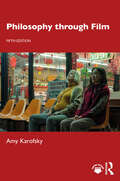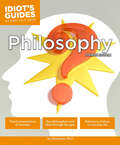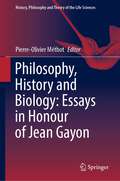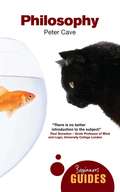- Table View
- List View
Philosophy Hacks (Hacks Ser.)
by Robert Arp Martin CohenDiscover the simple way to understand and remember the most groundbreaking concepts in 3,000 years of philosophical thought. Each idea is broken down into three stages: 1/ The helicopter view, which gives you an introduction to the idea, and some context around it. 2/ The shortcut, which gives you the core elements of the theory, along with a range of examples that everyone can understand. 3/ The hack, which is a one-liner designed to stick in your memory and give you an instant grasp of the concept.From Pascal's Wager to Kant's categorical imperative, and from Camus's Existential Nihilism to Arendt's Banality of Evil, there are 100 concepts explained. The perfect introduction to philosophy, this is a great new way to learn about the most important philosophical ideas and concepts in a way that makes them easy to recall even months after reading the book.
Philosophy Hacks (Hacks)
by Robert Arp Martin CohenDiscover the simple way to understand and remember the most groundbreaking concepts in 3,000 years of philosophical thought. Each idea is broken down into three stages: 1/ The helicopter view, which gives you an introduction to the idea, and some context around it. 2/ The shortcut, which gives you the core elements of the theory, along with a range of examples that everyone can understand. 3/ The hack, which is a one-liner designed to stick in your memory and give you an instant grasp of the concept.From Pascal's Wager to Kant's categorical imperative, and from Camus's Existential Nihilism to Arendt's Banality of Evil, there are 100 concepts explained. The perfect introduction to philosophy, this is a great new way to learn about the most important philosophical ideas and concepts in a way that makes them easy to recall even months after reading the book.
Philosophy In a Week: Teach Yourself
by Mel ThompsonLearn in a week, remember for a lifetime!In just one week, this accessible book will give you knowledge to last forever. End of chapter summaries and multiple choice questions are all designed to help you test your knowledge and gain confidence. So whether you are a student or you simply want to widen your knowledge, you will find this seven-day course a very memorable introduction.Sunday: Think about knowledge like a philosopherMonday: Consider what science is and how we gain knowledge of the natural worldTuesday: Explore how we speak and think, and how this relates to the philosophy of mind.Wednesday: Learn how philosophers view and engage with religionThursday: Engage with ethics - how we decide what is the right thing to doFriday: Discover how political philosophers have balanced the role of government with individual freedom.Saturday: Explore continental ideas such as existentialism and how the next generation of philosophers may build on them.
Philosophy In a Week: Teach Yourself
by Mel ThompsonLearn in a week, remember for a lifetime!In just one week, this accessible book will give you knowledge to last forever. End of chapter summaries and multiple choice questions are all designed to help you test your knowledge and gain confidence. So whether you are a student or you simply want to widen your knowledge, you will find this seven-day course a very memorable introduction.Sunday: Think about knowledge like a philosopherMonday: Consider what science is and how we gain knowledge of the natural worldTuesday: Explore how we speak and think, and how this relates to the philosophy of mind.Wednesday: Learn how philosophers view and engage with religionThursday: Engage with ethics - how we decide what is the right thing to doFriday: Discover how political philosophers have balanced the role of government with individual freedom.Saturday: Explore continental ideas such as existentialism and how the next generation of philosophers may build on them.
Philosophy Made Simple (2nd Edition, Revised)
by Richard H. Popkin Avrum StrollFor almost four decades, Made Simple books have set the standard for continuing education and home study. In answer to the changing needs of today's marketplace, the Made Simple series for the '90s presents a thoroughly up-to-the-minute portfolio of skills, information, and experience, with revised and updated editions of bestselling titles, plus a whole range of new subjects from personal finance to office management to desktop publishing.
Philosophy and Engineering: An Emerging Agenda
by Ibo van de Poel David E. GoldbergWhereas science, technology, and medicine have all called forth dedicated philosophical investigations, a fourth major contributor to the technoscientific world in which we all live - that is, engineering - has been accorded almost none of the philosophical attention it deserves. This volume thus offers a first characterisation of this important new field, by some of the primary philosophers and ethicists interested in engineering and leading engineers interested in philosophical reflections. The volume deals with such questions as: What is engineering? In what respect does engineering differ from science? What ethical problems does engineering raise? By what ethical principles are engineers guided? How do engineers themselves conceive of their profession? What do they see as the main philosophical challenges confronting them in the 21st century? The authors respond to these and other questions from philosophical and engineering view points and so illustrate how together they can meet the challenges and realize the opportunities present in the necessary encounters between philosophy and engineering - encounters that are ever more important in an increasingly engineered world and its problematic futures.
Philosophy as Practice in the Ecological Emergency: An Exploration of Urgent Matters (Sustainable Development Goals Series)
by Lucy WeirThis book argues that philosophy is as practical as plumbing and what we need right now is what philosophers can offer as philosophers to help us all, our species, and beyond, through this ecological emergency, this climate change, this anthropocene. This book is about the meaning and purpose of philosophy as a way of, a practice of, responding to the ecological emergency, which includes climate change, biodiversity loss, pollution, habitat destruction, and all the associated impacts that fragment, and threaten to create collapse, among the systems that created and sustain us. There are the related economic and social impacts, the fragmentation of communities and political ideologies through attitude polarisation, and the increasing threats to systems by those who seek to promote further exploitation at the expense of attempts to regain some system of cooperation and an attitude of compassion which is at the heart of our survival strategies as a species. Philosophy has always sought to address questions related both to our place in the universe, and to how to live, given our understanding of our place. Those of us committed to a philosophical life have used a range of metaphors and narratives to enlighten, and to exhort to action, those who would seek to understand what to do, how, and why. Philosophy has played a key role in helping us as a species to respond to the ecological emergency. What, then, is the practice of philosophy, given that we’re in an ecological emergency?This question is the thread, and it forms the framework for the dialogue that runs through the book.
Philosophy for Engineering: Practice, Context, Ethics, Models, Failure (SpringerBriefs in Applied Sciences and Technology)
by Priyan DiasThis book highlights the unique need for philosophy among engineers, which stems from issues regarding their knowledge (epistemology), role or being (ontology) and influence (ethics). It discusses practice, context, ethics, models and failure as key aspects of engineering, and provides an easy but essential introduction to philosophy for engineers by presenting four key philosophers and linking them to these aspects: Karl Popper (failure), Thomas Kuhn (models), Michael Polanyi (practice & ethics) and Martin Heidegger (context & ethics). Popper, Kuhn and Polanyi are philosophers of science (epistemologists) who have challenged the view that science is a ‘cool, detached’ discipline, since it also depends on human imagination (Popper), consensus (Kuhn) and judgment plus artistry (Polanyi); factors that are central to engineering. Heidegger (an ontologist) critiqued technology on the one hand (ethics), but also stressed the importance of ‘doing’ over ‘knowing,’ thus ‘authenticating’ the highly pragmatic engineering profession. Science is the ‘core’ component of engineering, which is overlaid by a variety of heuristics . Practice-based knowledge can be formalized, with artificial intelligence (AI) offering a valuable tool for engineering, just as mathematics has done for science. The book also examines systems thinking in engineering. Featuring numerous diagrams, tables and examples throughout, the book is easily accessible to engineers.
Philosophy in Minutes
by Marcus WeeksPhilosophy in Minutes distills 200 of the most important philosophical ideas into easily digestible, bite-sized sections.The core information for every topic - including debates such as the role of philosophy in science and religion, key thinkers from Aristotle to Marx, and introductions to morality and ethics - is explained in straightforward language, using illustrations to make the concepts easy to understand and remember.Whether you are perplexed by existentialism or pondering the notion of free will, this accessible small-format book will help any reader to quickly grasp the basics of this highly nuanced subject.
Philosophy in Schools: An Introduction for Philosophers and Teachers (Routledge Studies in Contemporary Philosophy #47)
by Thomas E. Wartenberg Sara Goering Nicholas J. ShudakAll of us ponder the big and enduring human questions—Who am I? Am I free? What should I do? What is good? Is there justice? Is life meaningful?—but this kind of philosophical interrogation is rarely carefully explored or even taken seriously in most primary and secondary school settings. However, introducing philosophy to young people well before they get to college can help to develop and deepen critical and creative thinking, foster social and behavioral skills, and increase philosophical awareness. Philosophy in Schools: An Introduction Philosophers and Teachers is an invaluable resource for students and practitioners who wish to learn about the philosophy for children movement, and how to work its principles into their own classroom activities. The volume provides a wealth of practical information, including how to train educators to incorporate philosophy into their daily lessons, best practices and activity ideas for every grade level, and assessment strategies. With contributions from some of the best practitioners of philosophy for children, Philosophy in Schools is a must-have resource for students of philosophy and education alike.
Philosophy in Science
by Michael HellerThe traditional topics of the "philosophy of nature" -- space, time, causality, the structure of the universe -- are overwhelmingly present in our modern scientific theories. This book traces the complex paths that discussion of these topics has followed, from Plato and Aristotle, through Descartes, Leibniz, Kant and other great thinkers, right up to the relativistic cosmologies and the grand unified theories of contemporary science. In the light of this historical development, it becomes clear that modern science gives us not only a technological power over the world, but also a deeper understanding of physical reality. In this sense, science could be regarded as an heir to the traditional "philosophy of nature". Moreover, the reader will learn why science itself deserves to be the subject of philosophical reflection.
Philosophy of Behavioral Biology
by Thomas A.C. Reydon Kathryn S. PlaisanceThis volume provides a broad overview of issues in the philosophy of behavioral biology, covering four main themes: genetic, developmental, evolutionary, and neurobiological explanations of behavior. It is both interdisciplinary and empirically informed in its approach, addressing philosophical issues that arise from recent scientific findings in biological research on human and non-human animal behavior. Accordingly, it includes papers by professional philosophers and philosophers of science, as well as practicing scientists. Much of the work in this volume builds on presentations given at the international conference, "Biological Explanations of Behavior: Philosophical Perspectives", held in 2008 at the Leibniz Universität Hannover in Germany. The volume is intended to be of interest to a broad range of audiences, which includes philosophers (e.g., philosophers of mind, philosophers of biology, and metaethicists), as well as practicing scientists, such as biologists or psychologists whose interests relate to biological explanations of behavior.
Philosophy of Communication (Palgrave Philosophy Today)
by Giacomo TurbantiBy comprehensively exploring the theoretical questions raised by professional communication, this book provides an introduction to the philosophy of communication. Key Features:Arranged in three parts encompassing the theory of communication, conflict transformation and the role communication plays within organizations. Examines how agreement is reached through communication, how such agreement is negotiated between different perspectives and how such negotiation produces our organizations. Includes a full range of pedagogical features, including study questions, essay questions. chapter summaries, focus points and suggestions for further reading. Philosophy of Communication is essential reading for all students of the philosophy of communication.
Philosophy of Computing: Themes from IACAP 2019 (Philosophical Studies Series #143)
by Björn Lundgren Nancy Abigail Nuñez HernándezThis book features a unique selection of works presented at the 2019 annual international conference of the International Association for Computing and Philosophy (IACAP). Every contribution has been peer-reviewed, revised, and extended. The included chapters are thematically diverse; topics include epistemology, dynamic epistemic logic, topology, philosophy of science and computation, game theory and abductive inferences, automated reasoning and mathematical proofs, computer simulations, scientific modelling, applied ethics, pedagogy, human-robot interactions, and big data, algorithms, and artificial intelligence.The volume is a testament to the value of interdisciplinary approaches to the computational and informational turn. We live in a time of tremendous development, which requires rigorous reflection on the philosophical nature of these technologies and how they are changing the world. How can we understand these technologies? How do these technologies change our understanding of the world? And how do these technologies affect our place as humans in the world? These questions, and more, are addressed in this volume which is of interest to philosophers, engineers, and computer scientists alike.
Philosophy of Engineering, East and West
by Carl Mitcham Bocong Li Byron Newberry Baichun ZhangThis co-edited volume compares Chinese and Western experiences of engineering, technology, and development. In doing so, it builds a bridge between the East and West and advances a dialogue in the philosophy of engineering. Divided into three parts, the book starts with studies on epistemological and ontological issues, with a special focus on engineering design, creativity, management, feasibility, and sustainability. Part II considers relationships between the history and philosophy of engineering, and includes a general argument for the necessity of dialogue between history and philosophy. It continues with a general introduction to traditional Chinese attitudes toward engineering and technology, and philosophical case studies of the Chinese steel industry, railroads, and cybernetics in the Soviet Union. Part III focuses on engineering, ethics, and society, with chapters on engineering education and practice in China and the West. The book’s analyses of the interactions of science, engineering, ethics, politics, and policy in different societal contexts are of special interest. The volume as a whole marks a new stage in the emergence of the philosophy of engineering as a new regionalization of philosophy. This carefully edited interdisciplinary volume grew out of an international conference on the philosophy of engineering hosted by the University of the Chinese Academy of Sciences in Beijing. It includes 30 contributions by leading philosophers, social scientists, and engineers from Australia, China, Europe, and the United States.
Philosophy of History (SparkNotes Philosophy Guide)
by SparkNotesPhilosophy of History (SparkNotes Philosophy Guide) Making the reading experience fun! SparkNotes Philosophy Guides are one-stop guides to the great works of philosophy–masterpieces that stand at the foundations of Western thought. Inside each Philosophy Guide you&’ll find insightful overviews of great philosophical works of the Western world.
Philosophy of Language in the Brentano School: Reassessing the Brentanian Legacy (History of Analytic Philosophy)
by Arnaud Dewalque Charlotte Gauvry Sébastien RichardThis collection of fourteen original essays addresses the seminal contribution of Franz Brentano and his heirs, to philosophy of language. Despite the great interest provoked by the Brentanian tradition and its multiple connections with early analytic philosophy, precious little is known about the Brentanian contribution to philosophy of language. The aim of this new collection is to fill this gap by providing the reader with a more thorough understanding of the legacy of Brentano and his school, in their pursuit of a unique research programme according to which the analysis of meaning is inseparable from philosophical inquiries into what goes on in the mind and what there is in the world. In three parts, the volume first reconstructs Brentano’s pathbreaking thoughts on meaning and grammatical illusions, exploring their strong connections with the Austro-German tradition and analytic philosophy. It then addresses the multifaceted debates on the objectivity of meaning in the Brentano School and its aftermath (Meinong, Husserl, Ingarden, Twardowski and the Lvov-Warsaw School). Finally, part three explores Brentano’s wider legacy, namely: Husserl’s theory of modification and typicality, Bühler’s theory of linguistic and non-linguistic expressions, and Wittgenstein’s thoughts on guidance and rule-following. The result is a unique collection of essays which shows the significance, originality and timely character of the Brentanian philosophy of language.
Philosophy of Law in Korea: Acceptance, Engagement and Social Change (Routledge Studies in Asian Law)
by Jeong-Oh Kim Hak Tai Kim Joon-Seok Park Dong-Ryong ShinWhen Korea began as a newly independent state in 1948, its economy was very underdeveloped and the rule of law was just established. The journey of democratization in Korea was not without challenges. This book traces the history of the legal philosophy development in Korea and highlights Korea's unique experience. This book shows how Western legal philosophy has been accepted in Korea, a non-Western country that has newly introduced the Western legal system and what role the legal philosophy has played in social context. The book also examines academic scholars' intellectual activities in a historical context and how their intellectual products are yielded through their continuous response to the circumstances of the time. It specifically looks at the many challenging tasks legal philosophers had to overcome in a society when the rule of law and democracy had not yet settled. The book explores how Korean legal philosophers coped during such unique historical situations. It also illustrates how Korean scholars accepted legal philosophies of Germany and jurisprudence and integrated them to change social realities of Korea. Through Korea’s experience, this book will provide insights into how modern legal philosophy develops in a new state and what legal philosophers' responses would be like during such a process. The developing process of legal philosophy in Korean society will interest not only readers in countries who have had similar experiences to Korea, but also readers in the West.
Philosophy of Law: The Supreme Court’s Need for Libertarian Law (Palgrave Studies in Classical Liberalism)
by Walter E. Block Roy WhiteheadLooking at discrimination, education, environment, health and crime, this volume analyses United States Supreme Court rulings on several legal issues and proposed libertarian solutions to each problem. Setting their own liberal theory of law, each chapter discusses the law at hand, what it should be, and what it would be if their political economic philosophy were the justification of the legal practice. Covering issues such as sexual harassment, religion, markets in human organs, drug prohibition and abortion, this book is a timely contribution to classical liberal debate on law and economics.
Philosophy of Meaning, Knowledge and Value in the Twentieth Century: Routledge History of Philosophy Volume 10 (Routledge History of Philosophy #Vol. 10)
by John V. CanfieldVolume 10 of the Routledge History of Philosophy presents a historical survey of the central topics in twentieth century Anglo-American philosophy. It chronicles what has been termed the 'linguistic turn' in analytic philosophy and traces the influence the study of language has had on the main problems of philosophy. Each chapter contains an extensive bibliography of the major writings in the field.All the essays present their large and complex topics in a clear and well organised way. At the end, the reader finds a helpful Chronology of the major political, scientific and philosophical events in the Twentieth Century and an extensive Glossary of technical terms.
Philosophy of Science and Sociology: From the Methodological Doctrine to Research Practice (Routledge Library Editions: History & Philosophy of Science)
by Edmund MokrzyckiOriginally published in 1983. This book concentrates on the impact of philosophy of science on sociology and other disciplines. It argues that the impact of the philosophy of science on sociology from the rise of the Vienna Circle until the mid-1980s resulted in a deep-reaching and, in the author’s view, undesirable methodological reorientation in sociology.
Philosophy through Film
by Amy KarofskyThis fifth edition of Philosophy through Film uses recently released, well-received movies to explore answers to classic questions in philosophy in an approachable yet philosophically rigorous manner. Author Amy Karofsky uses two films in each chapter to examine one long-standing philosophical question and assess some of the best solutions to it that have been offered. The chosen movies are not mere “add-ons” to an otherwise straightforward introductory text; instead, they are fully integrated into the discussion of the issues and the various positions. Each chapter also includes discussion questions, an annotated list of films related to the chapter topic, and two or three historically significant primary sources (which are collected together at the end of the book).Changes to the fifth edition include: The replacement of older movies with four new focus films: Anatomy of a Fall, Everything Everywhere All at Once, Get Out, and The Time Traveler’s Wife. The addition of new primary readings from Roderick Chisholm, Jerry Fodor, Baron d’Holbach, and Susan Wolf. Important new sections added to Chapter 1 on Truth (“The Identity Theory of Truth”) and Chapter 5 on Artificial Intelligence (“The I in AI”). A major overhaul of Chapter 6 on free will, determinism, and moral responsibility. Updated notes throughout. The films examined in depth are: Ad Astra; Anatomy of a Fall; Arrival; Beautiful Boy; Crimes and Misdemeanors; Divergent; Equilibrium, Everywhere Everything All at Once; Ex Machina; Get Out; Gone Baby Gone; Her; Inception; Edge of Tomorrow; The Matrix; Memento; A Serious Man; Silence; The Time Traveler’s Wife.For a collection of Story Lines of the Discussed Films by Elapsed Time, visit: www.routledge.com/9781032544595
Philosophy, Fourth Edition (Idiot's Guides)
by Jay StevensonA newly visual approach, this updated edition will include infographics, photos, and pull quotes to help reinforce learning of the subject of philosophy. Beginning with the pre-Socratics and Eastern philosophers, all of the major schools of thought are covered. Content includes religious philosophy, Renaissance humanism, enlightenment philosophers, idealism, existentialism, post-structuralism and post-modernism, and more.
Philosophy, History and Biology: Essays in Honour of Jean Gayon (History, Philosophy and Theory of the Life Sciences #30)
by Pierre-Olivier MéthotThis book builds on recent scholarship highlighted in the edited collections, Philosophie, histoire, biologie: mélanges offerts à Jean Gayon (Merlin & Huneman, 2018) and Knowledge of Life Today (Gayon & Petit 2018/2019). While honoring the career and the thought of Jean Gayon (1949-2018), this book showcases the continued relevance of Gayon’s interdisciplinary work and illustrates his central place in the community of historians and philosophers of the life sciences.Chapters in this book address Jean Gayon’s intellectual trajectory from historical epistemology to the philosophy of biology, the nature and scope of his philosophical approach to the history of science, and his unique contributions to the history and epistemology of biological concepts and theories. Drawing on published and unpublished sources, the book explores some of Gayon’s most significant contributions to the philosophy, history, and social studies of biology.
Philosophy: A Beginner's Guide (Beginner's Guides)
by Peter CavePhilosophy, the "love of wisdom", is the product of our endless fascination and curiosity about the world - the child of wonder. Through it, we seek to answer the most fundamental of questions: How do we know what we know? Does God exist? What is beauty? How should we live our lives? Who am I?In this exhilarating tour, Peter Cave navigates all the main topics in the subject with verve and clarity, from political philosophy to existentialism. Using witty and whimsical examples, including stoical sofas and Reg, the "regular" human, who just happens to carry his brain in a rucksack, Cave provides a welcome antidote to the dry textbook and underscores philosophy's enduring relevance today. Interspersed with helpful textboxes and mini biographies of the key thinkers, there is no better introduction for the aspiring sage.
